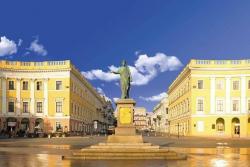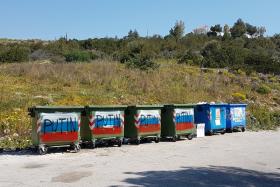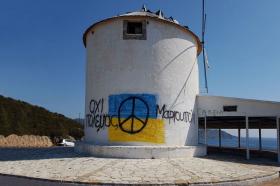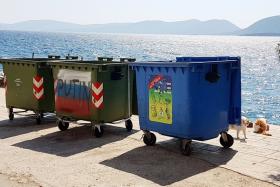Ukraine's Greek Names
 Following the horrific Russian invasion of Ukraine on Thursday 24th February 2022, most of the world has looked on in disbelief at the images being shown of the war in the independent media. Many Greeks reading the names of towns and cities in Ukraine in the news probably wonder why places like Mariupol, Melitopol, Simferopol and Sevastopol sound so familiar. As many places in Greece, all of these Ukrainian cities feature 'pol' or 'pil' in their name, that came from the Ancient Greek word 'polis' or city. The name of the coastal city of Mariupol, which is home to a large Greek community, comes from the name Maria and the the word Polis, meaning Virgin Mary's City. Melitopol stems from the name of the ancient city nearby, which was called Meliti, which comes from 'meli' or honey in Greek.
Following the horrific Russian invasion of Ukraine on Thursday 24th February 2022, most of the world has looked on in disbelief at the images being shown of the war in the independent media. Many Greeks reading the names of towns and cities in Ukraine in the news probably wonder why places like Mariupol, Melitopol, Simferopol and Sevastopol sound so familiar. As many places in Greece, all of these Ukrainian cities feature 'pol' or 'pil' in their name, that came from the Ancient Greek word 'polis' or city. The name of the coastal city of Mariupol, which is home to a large Greek community, comes from the name Maria and the the word Polis, meaning Virgin Mary's City. Melitopol stems from the name of the ancient city nearby, which was called Meliti, which comes from 'meli' or honey in Greek.
As the Ancient Greeks colonised much of the Mediterranian, the land under their control stretched up through to the Black Sea region. A large amount of the southern coast of Ukraine, along with the Crimean Peninsula, was home to many Greek cities. The beautiful southern coastal city of Odesa (pictured above) was named after an ancient Greek city called Odessos, and Kherson was named for another ancient Greek city called Chersonesus. Chersonesus, located in the south-western part of Crimea, was an ancient Greek colony founded approximately 2,500 years ago.
Most Ukrainians and Greeks are linked by their Orthodox Christian religion, and this bond has brought the countries close throughout the centuries. Grand Prince Volodymyr the Great introduced Orthodox Christianity from Byzantium to Kyiv and Kyivan Rus' in 988 AD, around 300 years before the founding and subsequent development of Moscow by the Mongols of the Golden Horde. The Orthodox Cathedral of Saint Sophia in Kyiv, built in 1011, (right) was based on Hagia Sophia in Constantinople and today is a UNESCO world heritage site. From Ukraine's 43 million citizens, 75% identify as members of the Ukrainian Orthodox Church and 10% identify as Greek Catholics of the Byzantine Rite, mostly located in Western Ukraine around the city of Lviv, originally known by its Greek name of Leopolis.
The 1814 Filiki Eteria secret society that first organised the overthrow of Ottoman rule in Greece was founded in Odesa, Ukraine. One of its leaders was the prominent Phanariote Prince Alexander Ypsilantis, involved in initiating the Greek War of Independence in the Spring of 1821. Greece and Ukraine share a great deal in their Orthodox Christian religion, common culture, art and history.
On 15th March 2022, Russia claimed it has taken full control of Greek-named Kherson oblast (province) in Ukraine. The capture of the entire Kherson oblast comes as Russian forces seized the port city, which has a population of 290,000 people, on 3rd March following a three day seige. It was the first major city to fall following Putin's Kremlin invasion of Ukraine on 24th February 2022. Kherson was founded by a decree from Catherine the Great on 18th June 1778 on the bank of the Dnipro (Dnieper) River as a fortress of the Black Sea fleet. It was named after the famous Greek city-colony of Chersonesus in Crimea.
Mariupol, a port city on the Sea of Azov which had a population of 446,000 people, continues to hold out against Russian armed forces, although it is totally surrounded and virtually destroyed by indiscriminate Russian bombardment. Brave Ukrainian and Greek defenders continue to defy Putin's Russian hordes. Its last defenders were holed up in the giant Azovstal steelworks, which hugs the southern part of the city, overlooking the sea. Thousands of steel workers, Ukrainian troops and civilians have been inside its vast labyrinth of underground tunnels throughout March and April 2022, constantly under Russian attack.
On Monday 17th May 2022, Russia gained full control of Ukraine's Mariupol after the last Ukrainian soldiers were evacuated from the Azovstal steel plant. Mariupol is now in total ruins after an 82-day Russian siege that Ukraine says killed tens of thousands of people that lived in this Greek-named coastal city.


Although not all the people of Greece support the Ukrainian situation, artists in Ermioni were busy, following the destruction of Mariupol by Putin's 'liberators'.